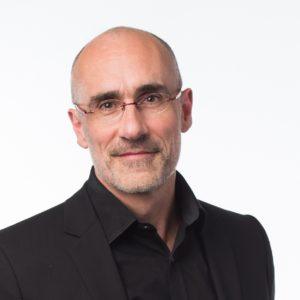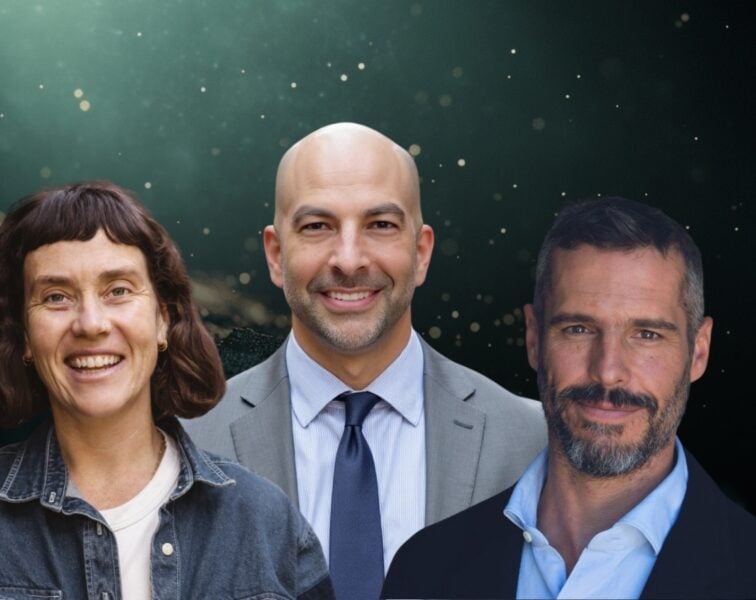Arthur Brooks is a social scientist, professor at Harvard University, columnist for The Atlantic, and bestselling author. In this episode, Arthur returns to the podcast to discuss his new book, Build the Life You Want. He delves into the nuanced concept of happiness, differentiating between momentary feelings and overall wellbeing. He explains the importance of understanding one’s personality pattern with respect to positive and negative emotions in order to better self-manage emotions. He delves into the three key elements of happiness, offering practical strategies for enhancing those specific domains through methods such as metacognition, transcendent experiences, discipline, minimizing self-focus while directing attention outward, and more. Through personal examples, Arthur demonstrates that one can actively track well-being levels and take intentional steps to cultivate happiness and enhance overall well-being.
Subscribe on: APPLE PODCASTS | RSS | GOOGLE | OVERCAST | STITCHER

We discuss:
- Happiness vs. happy feelings, and how happiness and unhappiness can coexist [4:30];
- The six fundamental emotions [8:00];
- The evolution and heritability of happiness, and the four personality patterns with respect to positive and negative emotions [17:30];
- Navigating relationships: the power of complementarity over compatibility [23:30];
- The importance of self-managing your mental habits [25:30];
- Enjoyment: one of the three macronutrients of happiness [32:00];
- Satisfaction: one of the three macronutrients of happiness [43:45];
- The reverse bucket list, metacognition, and other techniques to protect yourself from your limbic system [51:00];
- Meaning: one of the three macronutrients of happiness [57:30];
- The four quarters of your life and how that relates to the meaning of your life [1:05:00];
- Putting metacognition into practice [1:09:00];
- What might explain the societal downdrift in happiness over the last few decades? [1:17:00];
- Taking charge of your happiness: discipline, transcendent experiences, and other deliberate actions for happiness [1:30:30];
- Tracking happiness: biomarkers and micronutrients behind the macronutrients of happiness [1:42:00];
- The value in minimizing the self and looking outward [1:49:45];
- How Arthur surprised himself with his ability to improve his happiness [1:54:00]; and
- More.
Get Peter’s expertise in your inbox 100% free.
Sign up to receive An Introductory Guide to Longevity by Peter Attia, weekly longevity-focused articles, and new podcast announcements.
Happiness vs. happy feelings, and how happiness and unhappiness can coexist [4:30]
the interplay of positive and negative emotions between happiness and unhappiness
- Peter congratulates Arthur on his new book and adds, “This is not your first, second or third rodeo, but I’m sure each time, it’s a little bit of a what’s the world going to think?”
- Arthur thinks writing a book is like having a child, “A book is something where as you bring it into the world you go through…” [stages]
- He remembers Elisabeth Kübler-Ross, the Swiss psychiatrist who wrote that famous book about death and dying
- You have to go through five stages
- Most of that research has been questioned since then, but it’s pretty interesting
- When writing a book, you go through bargaining and denial and rage, and finally there’s acceptance but you’re still nervous for sure
What’s the difference between happiness and happy feelings? Are they the same thing?
- They’re not the same thing, and this is a really important misconception
- Most of us live in the era of feelings
- Arthur adds, “If you’d talk to my parents or, god knows, my grandparents about feelings, they would scratch their head. What are you talking about?”
- You’re talking about your emotions all the time
- Ephemera feeling seems so counterproductive
- Our grandparents were right: feelings are not happiness any more than the smell of the turkey is your Thanksgiving dinner
- Feelings are evidence of happiness, and that’s incredibly good news
A lot of people think that happiness is a feeling. It’s quite incorrect.
- There are many better technical definitions of happiness, but they produce a lot of feelings
- They’re associated with a lot of emotions, which is limbic system activity (a part of the brain)
- A 40-million year evolutionary process that developed the limbic system to create emotions
- That signals information and is what emotions come from
- They’re associated with a lot of emotions, which is limbic system activity (a part of the brain)
“If you mistake these feelings for the underlying phenomenon of happiness, you’re going to be chasing it all over the place. You’ll be chasing ghosts, how I slept last night, what I ate for breakfast, if my spouse yelled at me this morning.”‒ Arthur Brooks
- If you mistake the feelings of happiness for the underlying phenomenon of happiness, you wind up being managed as opposed to having any prayer of managing your own happiness
That’s the first thing to keep in mind: it’s not feelings
- Peter reflects, “It’s hard to differentiate though… you have to remind yourself when you’re in the throes of what I just referred to as negatively valenced feelings, that this is not a statement of my overall state of happiness.”
What’s the relationship between unhappiness and happiness? Are they polar images? How do they coexist?
- If you go back to the ancient philosophers, there was the idea that happiness and unhappiness exists on a spectrum
- So unhappiness would be the lack of happiness
- We know a lot better now given the explosion of neuroscience and the way that emotions are produced that in fact, you can be happy and unhappy
- Or have happy and unhappy feelings in parallel
- For example, the average person spends about 40% of their time with predominantly positive feelings
- It sits in a neutral idle of positivity
- Most people do, not everybody
- About 16 or 17% of the time, the average person has predominantly negative feelings, something is going on
- That’s more intense
- And part of the reason is because negative emotions get your attention and they’re supposed to
- Evolution favors negative emotions
- Positive emotions are nice to have, but negative emotions, pay attention because that could cost you your life
The six fundamental emotions [8:00]
What are some of the most powerful negative emotions that would drive action?
If you think about his evolutionarily, and not even going back to millions of years ago but just going back hundreds of thousands of years ago to the origin of our species as homo sapiens
- There are basically six fundamental emotions or basic emotions
- These are the building blocks of all emotional life that are produced by the limbic system of the brain, four negative and two positive
- The four negative emotions are sadness, anger, fear and disgust
- All four of those have a very strong evolutionary basis
- Fear and anger have to do with threat
- They involve the amygdala of the brain
- When a car is about to run you over and you’re a pedestrian in a crosswalk, that crosses your visual cortex and is recorded in the occipital lobe of your brain as an enormous predator
- That signals to your amygdala to send the signal through the hypothalamus of your brain to your pituitary glands (which signals your adrenal glands above your kidneys) to spit out stress hormones
- That happens in 74 milliseconds
- By that time, you’re sweating, your heart is pumping, you’ve jumped out of the way and you’ve flipped off the driver, a combination of fear and anger in response to the enormous predator
- Three seconds later, your prefrontal cortex catches up and you say, “I shouldn’t have flipped him off. That’s not my values,” or whatever it happens to be
- So that’s your limbic system keeping you alive (that’s fear and anger)
- Disgust involves the insular cortex of the brain, also part of the limbic system
- That’s when you pull something out of the back of your fridge you forgot about a few weeks ago, and you hold it and you’re like, “Oh.”
- That signals don’t eat it
- And so anything that might carry a pathogen signals that basic negative emotion of disgust to you
- Now, it can be misattributed to people, and that’s what demagogic politicians always do
- That’s what the media does to us
- It tries to reprogram the insula of the limbic system of the brain so that when somebody disagrees with you politically, you look at them like a cockroach
- That’s what demagogic leaders and dictators have done for time immemorial so that people will undertake barbaric acts against people in their own countries, at least of war, etc.
- That’s when you pull something out of the back of your fridge you forgot about a few weeks ago, and you hold it and you’re like, “Oh.”
- Last but not least is sadness, and sadness has also evolved
- Sadness is what you feel largely in the dorsal anterior cingulate cortex of the brain, another part of the limbic system, that’s mental pain usually when you’re either socially excluded or you’re separated from a loved one
- Now that’s something that’s evolved because you don’t want to be separated from your tribe
- You don’t want to walk the frozen tundra and die alone
- But what happens, for example, in grief?
- Grief is unremediated sadness
- And the reason is because your brain is saying make this separation go away, and you can’t because the other person is permanently gone
- And so the grief is just this pulsating activity in the dorsal anterior cingulate cortex of the brain saying “I must be reunited with that person but I can’t be”
- In many cases it takes a lot of time for the dorsal anterior cingulate cortex to stop registering that sadness, that pain
- Peter adds, “The sadness we feel when a person dies, which would be the ultimate form of separation, is a more extreme version of, say, a social isolation that you might feel, like what a kid feels if they go to sit at the cafeteria table and all the other kids get up and walk away.”
There are interesting studies that look at how grief registers in the brain
{end of show notes preview}
Would you like access to extensive show notes and references for this podcast (and more)?
Check out this post to see an example of what the substantial show notes look like. Become a member today to get access.

Arthur Brooks, Ph.D.
Arthur C. Brooks is the Parker Gilbert Montgomery Professor of the Practice of Public and Nonprofit Leadership at the Harvard Kennedy School, and Professor of Management Practice at the Harvard Business School, where he teaches courses on leadership and happiness. He is also a columnist at The Atlantic, where he writes the popular “How to Build a Life” column. Brooks is the author of 13 books, including the 2023 #1 New York Times bestseller Build the Life You Want: The Art and Science of Getting Happier with co-author Oprah Winfrey, and the 2022 #1 New York Times bestseller From Strength to Strength: Finding Success, Happiness, and Deep Purpose in the Second Half of Life. He speaks to audiences all around the world about human happiness and works to raise well-being within private companies, universities, public agencies, and community organizations.
Instagram: arthurcbrooks
Website: arthurbrooks.com
X (formerly twitter): @arthurbrooks



